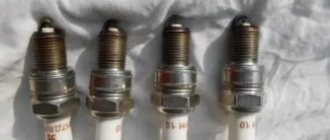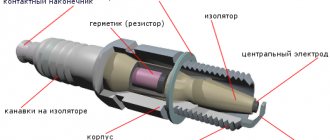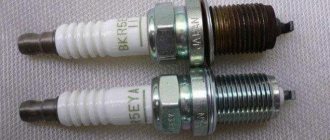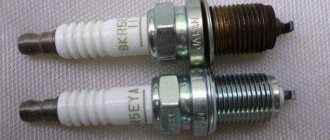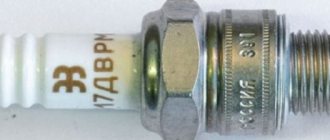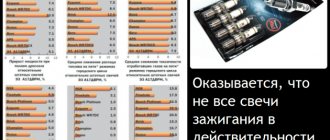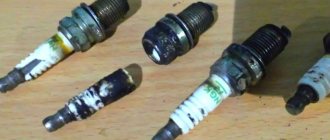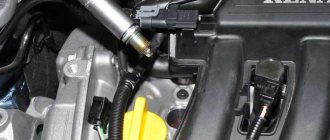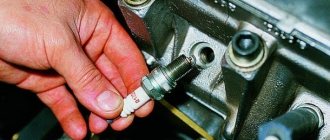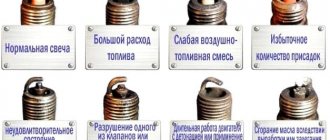NGK spark plugs are a well-known product of the Japanese company of the same name, which was founded back in 1919. This manufacturer specializes in producing a whole list of high-quality components and other elements for all kinds of internal combustion engines.
As for candles, mass production of products with various standard sizes and other characteristics has been established, thanks to which it is possible to choose the appropriate option for almost any car and other types of vehicles. For selection, you can use the original printed or electronic NGK catalog; choosing candles online is not difficult. The main thing is to have a stock of certain knowledge.
You can also use online services that implement a more simplified automatic selection of spark plugs by car make (NGK spark plugs and products from other manufacturers in this case are usually selected by vehicle manufacturer, model and VIN code of the car).
Please note that in some cases, selecting spark plugs based only on the car model may not be entirely accurate. For this reason, it is highly advisable to know the article number before purchasing a particular NGK candle, as well as what the marking of NGK candles means. In this article we will look at what types of NGK candles there are and what is the meaning of the NGK candle markings. We will also talk about the average service life of NGK spark plugs and discuss the question of how counterfeit NGK spark plugs are determined.
NGK spark plug design. Marking. Heat number
Design of a standard spark plug Marking of NGK spark plugs
The letter combination (1-4) before the heat number gives instructions regarding the thread diameter, hex wrench opening, as well as design features. The fifth position (number) is for the heat number. The sixth letter indicates the thread length. The seventh letter contains data regarding the design features of special spark plugs. The eighth position, again a number, encodes a special gap between the electrodes.
Heat number
Modern spark plugs are individually selected for different engine designs and driving conditions. Therefore, it is impossible to specify a spark plug that will function without problems in all engines.
Since the temperature rises differently in the combustion chamber of different engines, spark plugs with different thermal equivalents are needed.
These heat equivalents, expressed in terms of heat rating, represent the average temperatures measured at the electrodes and insulator corresponding to the engine load. On the insulator skirt, the operating temperature should be in the range from 400°C to 850°C. In this case, temperatures above 400°C are required because at such temperatures the deposited soot and oil deposits are removed, and thus the self-cleaning of the spark plug occurs.
However, the temperature on the insulator should also not rise above 850°C, since at temperatures above 900°C glow ignition may occur. In addition, at very high temperatures, the electrodes are additionally exposed to chemically aggressive compounds or are destroyed.
For NGK spark plugs, a simple rule of thumb applies: - low heat rating (eg BP4ES) - “hot spark plug”, high heat absorption due to the long insulator skirt; - high heat rating (for example BP8ES) - “cold spark plug”, low heat absorption due to the short insulator skirt.
Surface discharge spark plugs
The operating principle of semi-surface discharge spark plugs is based on the fact that the ignition spark slides through a preferred part of the insulator skirt and removes possible soot deposits.
Only then does a spark breakdown occur from the insulator skirt to the side electrodes and reliable ignition of the fuel mixture occurs.
Spark plugs with extra spark gap
In the case of NGK spark plugs with an additional spark gap, the spark breakdown, when heavily covered with soot, first passes through the insulator skirt, then jumps when an ignition spark is formed to the place where the spark plug body approaches the insulator skirt (1). The fuel mixture ignites flawlessly and the engine runs normally.
After reaching the self-cleaning temperature (>450°C), carbon deposits are removed from the insulator skirt and ignition is again carried out normally between the central and side electrodes (2). Spark plug tightening torques
If the applied spark plug torque is too low, there is a risk of loss of compression, loosening of the center electrode and thermal damage due to reduced heat dissipation. It may even come down to unscrewing the spark plug yourself. If the tightening torque is too high, the cylinder head may be damaged. Additionally, applying too much force to the spark plug can cause the threads to strip.
The tightening torque can be obtained after tightening by measuring the height (thickness) of the O-ring. A spark plug whose O-ring is not compressed is tightened with too little torque. On the contrary, a spark plug with an o-ring that is too compressed is tightened with too high a tightening torque.
| Torque for Flat Fit Spark Plugs (with O-Ring) | 18mm | 14 mm | 12 mm | 10 mm |
| Cast iron head | 35-45 N.m | 25-35 N.m | 15-25 N.m | 10-15 N.m |
| Aluminum head | 35-40 N.m | 25-30 N.m | 15-20 N.m | 10-12 N.m |
www.ngk.ru
How to spot a fake
Ngk selection of spark plugs by car make, description and labeling.
The downside of popularity is the huge amount of counterfeit products on the market. To be convinced of this, you don’t even have to go to a car store: on Ebay or Aliexpress, type “spark plug” in the search, and it will immediately give you a huge number of candles in familiar packaging and, of course, from China. Such volumes of counterfeit goods have already seriously damaged the company’s reputation - in many car repair shops to this day, in case of any problems with ignition, the first answer is “You first install normal spark plugs, not NGK ones.”
So, how can you spot a fake on a display? Let's start with the packaging. The slightest “jambs” in printing clearly indicate a cheap counterfeit; the boxes of original candles are always perfect.
The workmanship itself speaks for itself.
The contact tip of the original NGK seems to be made in one piece with the spark plug: it is impossible to unscrew it with your fingers. Markings on the insulator and metal skirt must be clear and even. The threads on original products are rolled, so they are always smooth and even. The roughness of the carving and the marks of the chisel indicate a dubious origin. Crooked electrodes, especially deviation of the side electrode from the central axis, is also a reason to refuse the purchase.
With counterfeit V-Line spark plugs, the direction of the groove in the central electrode is almost always disrupted - if at the factory, when soldering the side electrode, it is centered exactly along the groove, then with “basement” plugs their mutual orientation can be absolutely any. For candles with electrodes made of noble metals, since they are much more labor-intensive to manufacture, the differences from “singed” ones are even more striking, since it is unprofitable to fully maintain complex technology in the conditions of “left-handed” production.
Video: How to distinguish fake candles from the original
The leader in the production of spark plugs for gasoline-type internal combustion engines and glow plugs for diesel units is the Japanese company NGK. The company was founded 100 years ago, in 1919, and was called NGK INSULATORS., LTD. In 1936, the company became known as NGK SPARK PLUG CO., LTD.
NGK Technologies
Invented more than half a century ago, the classic spark plug certainly still works today. However, due to the constant increase in environmental safety standards, it is simply no longer possible to use such models. With a large surface area of the electrode on which the discharge occurs, it is necessary to increase the discharge power. In this case, the emerging spark itself does not stand still, but seems to float, and therefore cannot maintain the severity of the moment and the speed of propagation of the flame front.
V-Line is a technology from NGK, with the help of which it was possible to find a compromise solution to overcome this situation. It consists of creating a V-shaped groove at the end of the main electrode, located parallel to the side electrode. Interestingly, Denso also uses a similar method with the difference that the groove is applied to the surface of the side electrode.
Spark plugs manufactured using V-Line technology are distinguished by a small surface area on which a spark is formed. By keeping the ignition system unchanged, this makes it possible to significantly increase the intensity of the interelectrode electrostatic field. In other words, the technology increases spark power and stability compared to previously used modifications. It should be noted that due to the fact that the spark jumps from the edge, in the place where maximum ventilation occurs, the smooth operation of the engine is improved. This is especially noticeable in lean mixtures, particularly at idle.
An interesting feature of NGK spark plugs with a semi-sliding surface discharge. Here, the main electrode is entirely contained in an insulator, compared to traditional multi-electrode designs.
This gives the advantage of running the engine on rich mixtures or in worn-out systems. The resulting carbon deposits on the conductors practically do not reduce the effectiveness of the spark plug, so that it is able to maintain functionality even with severe contamination.
The new platinum and iridium spark plugs from NGK feature advantages such as maximum spark stability due to the small diameter of the main electrode and minimal erosion. Equipping engines of modern cars coming off the assembly line with such spark plugs is one of the best indicators of their high service life.
It is interesting to note that NGK developers are constantly working to improve glow plugs. Thus, the new hybrid spark plugs they created, in addition to the main central platinum electrode, have an additional side electrode. The latter works in tandem with two additional electrodes and is soldered with platinum. Their operation is based on the principle of a semi-sliding surface discharge. As soon as carbon deposits form on the spark plug, the additional electrodes begin to work. As a result, engine stability is maintained at a high level. At the same time, the main spark plug heats up and the carbon burns out completely.
How to spot fake spark plugs?
The great popularity of NGK spark plugs has its bad downside - a huge number of fakes. Counterfeit is widespread in both real and virtual stores. Naturally, this could not but affect the reputation of the manufacturer’s original products.
NGK spark plugs, how to spot a fake.
Therefore, in order not to fall into a false opinion and not buy a fake, you need to learn to distinguish the original from the counterfeit. First of all, you need to pay attention to the packaging. And the first thing that may catch your eye is the “crooked” printing. The quality of the image and all packaging details from the manufacturer is always at its best, unlike scammers.
Original NGK spark plugs and fakes.
The appearance and design of the product itself is no less important. Thus, the contact tip of an NGK spark plug looks like one piece with the spark plug body. It is simply impossible to unscrew it with all the strength of your hands. The marked inscription must be distinct, clear and uniform. The thread on the original spark plug, rolled on a high-precision machine, always looks perfectly even and smooth. If it has roughness and traces of the work of a cutter, then this clearly indicates a fake. The presence of crooked electrodes or their visible deviation from the central axis is another clear sign of counterfeit.
Pros and cons of NGK spark plugs
NGK products are mostly characterized by positive reviews. In addition to the highest quality and compliance with international standards, this was made possible thanks to the following advantages:
- Iridium and platinum spark formers are made on the basis of alumina - a dielectric of increased strength and good conductivity.
- Insurance against spark overlap is provided by a corrugated tip.
- High thermal conductivity prevents the candle from overheating.
- Protection of the spark plug from temperature changes and deformation is provided by a high-strength insulator.
- Completely sealed spark plug housing.
- The copper core provides a high heat rating and wear resistance. It is characterized by low resistance and high thermal conductivity.
- Candles are not subject to soot formation.
- Good performance characteristics for screwing in/out thanks to cold-rolled threads.
NGK
Spark plug heat number: what is it?
NGK is a Japanese company, a world leader in the production of spark plugs.
The marking of candles looks like this:
- B4H - corresponds to our A11;
- BPR6ES - A17DVR.
What do these numbers mean?
В4Н - Diameter and thread pitch - Latin letter "B" - M14x1.25, other sizes are designated - A, C, D, J.
4 is the heat number. There may also be designations from two to 11. “H” - length of the threaded part - 12.7 millimeters.
BPR6ES - standard thread, "P" - projection insulator, "R" - there is a resistor, 6 - heat rating, "E" - thread length 17.5 mm, "S" - spark plug features (standard electrode).
If we see a number after the marking with a hyphen, for example BPR6ES-11, then it marks the gap between the electrodes, that is, 1.1 millimeters.
Bosch
Marking on the same principle - WR7DC:
- W - standard thread 14;
- R - resistance against interference, resistor;
- 7 - heat number;
- D is the length of the threaded part, in this case 19, the advanced position of the spark;
- C - copper alloy electrode (S - silver, P - platinum, O - standard composition).
That is, we see that the WR7DC spark plug corresponds to the domestic A17DVR, which is usually screwed into the head of the VAZ 2101-2108 block and many other models.
Brisk
Brisk is a Czech company that has existed since 1935, its products are very popular in our country.
Candles are marked as follows:
- D — case size 19 mm, wrench 14, standard thread 1.25 mm;
- O - special design that complies with the ISO standard;
- R - resistor (X - protective resistance against electrode burnout);
- 15 is the heat number (from 08 to 19; it is also interesting that superstitious Czechs do not use index 13);
- Y - remote arrester;
- C - copper electrode core (corresponds to the first letters of the Latin names of the elements - IR - iridium);
- 1 - gap between electrodes 1-1.1 mm.
Beru
Beru is a German Premium brand of Federal-Mogul, which produces a wide variety of spare parts for the aftermarket, including spark plugs.
The spark plug designation is indicated as follows - 14R-7DU (corresponds to A17DVR).
- 14 — thread 14x1.25 mm;
- built-in resistor;
- heat number 7 (from 7 to 13);
- D — length of the threaded part is 19 mm with a cone seal;
- U - copper-nickel electrode.
14F-7DTUO: standard size spark plug, seat larger than the nut (F), for low-power motors (T) with an O-ring, O - reinforced central electrode.
Champion
You can also figure out candles from this manufacturer without much difficulty, especially if the candle is in front of your eyes.
Let's give a simple example of decryption.
- resistor (E - screen, O - wire resistor);
- N - standard thread, length 10 millimeters;
- 9 — heat number (1-25);
- BYC - copper core and two side electrodes (A - standard design, B - side electrodes);
- 4 - spark gap (1.3 millimeters).
That is, this spark plug is a multi-electrode version of the A17DVRM.
You can give many more examples of decoding designations on products from other manufacturers. In addition to those listed, we have the following popular brands (we will indicate how they mark the most common type of spark plug A17DVR):
- AC Delco USA - CR42XLS;
- Autolite USA - 64;
- EYQUEM (France, Italy) - RC52LS;
- Magneti Marelli (Italy) - CW7LPR;
- Nippon Denso (Czech Republic) - W20EPR.
It is clear that we have given the simplest examples of decryption. New solutions are constantly emerging, for example, the central electrode is made not from copper-nickel alloys, but from more expensive metals - iridium, platinum, silver. Such candles will cost more, but will also last longer.
If you don’t know whether this spark plug can be installed on your engine, then first of all look for the interchangeability table and carefully re-read the instructions for your car.
NGK product marking
Due to the fact that the company is engaged in the production of spark plugs for various types of power units, it has developed an individual classification of its products, which can be found on the company’s official websites or printed catalogs.
The marking of NGK spark plugs consists of Latin letters, as well as digital designations, the interpretation of which is given in the attached table:
In order to understand such markings, let’s consider products that have the following digital and letter designations - bpr6es.
The first letter B means that the product has a thread diameter and a hexagon with a diameter of 14 millimeters/20.8 millimeters.
The second letter P indicates that the spark plug has a protruding insulator, and the designation R indicates that the product has an interference suppression resistor.
The number 6 refers to potassium indicators; according to the given markings, such a spark plug refers to moderately hot ignition elements. The Latin marking E indicates that the thread length is 19 millimeters, and S indicates that the candle has a standard design.
Here is a description of a specific product that has a specific marking.
NGK candle range
10 Best Spark Plugs
Knowledge alone about how to correctly decipher candle markings is not enough. The car owner should also know what models of spark plugs are on sale. Manufacturer NGK is constantly updating its product range, replacing old models with new ones that are more relevant for modern times:
- NGK Racing – spark plugs for racing car models. Suitable for the ultra-high loads encountered in professional racing competitions.
- NGK LaserLine – spark plug models for gas engines.
- NGK Glow are glow plugs used in diesel engines. The design has a special heating coil.
- NGK D-Power is a glow plug model for severe operating conditions. Designed to start a diesel engine at subzero temperatures. The assortment includes many modifications of this model, including ceramic ones.
- NGK Standart is a standard series of spark plugs. The design includes a central electrode made of nickel. Characterized by durability and good performance.
- NGK Platinum VX - spark plugs, unlike the normal modification, have platinum coating. The diameter of the central electrode reaches 0.8 mm. During operation it exhibits durability and reliability.
- NGK Laser Platinum - platinum coated spark plugs with corrugated fins designed to resist combustion.
- NGK Laser Iridium – NGK iridium spark plugs, spark plugs with an iridium electrode. They differ in service life of 100,000 km.
- NGK V-Line is a model of spark plugs with a notch on the main electrode in the shape of the letter V. They provide better ignition.
- NGK V-Power is a modification of spark plugs that has a copper core for maximum heat dissipation and a V-shaped notch.
The 10 series of spark plugs presented above are not the entire list of spark plugs from NGK, but only its most popular part. A more complete list is presented on the company website.
Counterfeit detection
The popularity of NLC candles has caused many counterfeit products to appear on the market. Externally, the product is very similar to the branded one, but its quality is much lower. You can distinguish a fake by carefully examining the candles. The following features are important:
- The packaging has even slots and resistant paint, and is glued together efficiently and reliably.
- The thread is knurled and there are no nicks or any irregularities on it. If the item is cut, this indicates that it is fake.
- The original has smooth, indelible, clear markings.
- The ceramics from which the insulator is made are of high quality. Its remains in powder form can be found on the metal part of the case.
- The terminal nut is tightly secured and requires considerable force to unscrew it.
- The electrode is well centered. The sparking end of the insulator is free of any contamination.
It may also be interesting: What kind of oil should I put in my engine for the winter?
A wide selection of NGK spark plugs allows you to choose the optimal model for almost any make of car. The high quality and reasonable price of the products ensures the popularity of the Japanese company's products in the market. Buying candles in trusted stores and carefully checking the purchased product will help you avoid counterfeits.
NGK selection of spark plugs by car make, description and marking
Japanese enterprise NGK Spark Plug Co., Ltd. Today it occupies a leading position in the global market in the production and sale of spark plugs. The main specialization of the company is gasoline engines - from small-displacement motor mowers to high-volume cargo units.
Click to enlarge.
NGK iridium spark plugs.
The NGK line of spark plugs is distinguished by standard characteristics and the ability to work at a given rhythm for a certain mileage without damage or failure. It is for this reason that many well-known car factories cooperate with NGK. The spark plugs of this brand fully justify the confidence of car manufacturers in terms of reliability and uninterrupted operation for the entire warranty period.
How to choose NGK spark plugs: decoding the markings
Each spark plug from the NGK manufacturer is individually marked
The alphanumeric combination characterizes its applicability for specific conditions and the motor, which is extremely important for the buyer to know. Unlike other companies, NGK products are strictly standardized
Now let’s look at two illustrative examples of how to choose the right NGK spark plugs based on the combination of marking letters, depending on the location of which the method of reading it also changes.
Example No. 1: decoding of NGK spark plug markings with the first letters A, B, C, D, E, AB, BC, BK, DC
For example, let's take a spark plug from the NGK line marked BPR7ES-11:
- The first one or two letters indicate the diameter of the thread/hexagon. The letter B is 14 mm / 20.8 mm. Size values vary depending on what specific letter or combination of letters is written.
- The second letter reflects the structure. The letter P from the example is a modification with a protruding insulator.
- The third letter is the type of resistor that suppresses interference. The letter R from the example means the presence of a resistor.
- The number - an extremely important parameter in choosing a candle - means the heat number. Number 7 from the example characterizes the candle as medium, that is, neither cold nor hot.
- The fourth letter in the marking is the length of the thread. The letter E from the example is equal to 19 mm.
- The fifth letter characterizes the design features. S in the example means standard type.
- The number located after the dash indicates the size of the gap between the electrodes. 11 – equal to 1.1 mm.
Example No. 2: decoding the marking of NGK spark plugs with the first letters D, I, L, P, S, Z
In this example, assume that you need to decipher the marking of a spark plug from the manufacturer NGK with the inscription SGR2P-10:
- The first letter indicates the type of candle. The letter S means that the spark plug has increased ignition reliability; its design has a square-shaped platinum insert. It should be remembered here that several letters written in a row can be used to designate the type of candle.
- The second letter is either the size of the thread itself, or the parameters of the hex key opening. The G in the example stands for 14mm thread or 19mm O-ring solution.
- The third letter stands for noise suppression resistor. The letter R stands for resistor.
- The number characterizes the heat value. So, number 2 from the example indicates that the candle is hot.
- The fourth letter shows design features. From example P is a platinum electrode.
- The number following the dash shows the size of the gap between the electrodes. In the example it is 1 mm.
Important! When choosing NGK brand spark plugs, rely solely on the official instructions given by the manufacturer itself
Design designation
Design features may have different marking options. They are indicated by the following symbols:
- B - contact fixed nut;
- SM, CS - compact side inclined electrode (insulator length is 18.5 mm);
- GV, G - spark plugs for racing cars;
- I—iridium-based electrode;
- J - two special side electrodes;
- IX - improved iridium electrode;
- K - two simple side electrodes;
- L—intermediate heat number;
- LM - compact type spark plug (insulator length 14.5 mm);
- P—platinum electrode;
- S - standard type;
- N—side single electrode of special shape;
- U—semi-surface discharge;
- Q or T - 4 and 3 side electrodes, respectively;
- VX - platinum-based spark plug;
- Y - electrode series V - Line with groove;
- Z is a special type design.
It may also be interesting: Why does the car start and stall after a few seconds?
For example, an NGK spark plug type BKR6E has an external thread with a diameter of 14 mm and a length of 19 mm. The hexagon size is 16 mm, heat rating is 6. The model is equipped with a resistor type of noise suppression.
Its applicability for cars without a catalyst is quite extensive. For example, the product is suitable for models Audi A 3, Hyundai S Coupe, Kia (Carens, Mentor, Rio, Sephia), Lada 110 and Vega, Opel Monterey A, etc.
Designation of spark plugs NGK marking
As mentioned above, decoding NGK candles helps to avoid errors and inaccuracies in the selection process. It is well known that the manufacturer sells products in branded packaging. As for markings, special codes can be found on the body of each spark plug.
Such designations on NGK spark plugs greatly simplify the entire selection process. Knowledge of the labeling allows you to accurately determine which option from the NGK product range will be the most suitable in terms of the main parameters. Marking codes are displayed in the NGK catalog, after which selection is carried out using printed tables, online services, etc. So, it is best to consider the issue of marking spark plugs using ready-made examples.
As can be seen from the examples, the most important parameters can be considered the type of spark plug itself and the physical dimensions, the features of the thread/spark plug, the heat index (the so-called “hot” and “cold” plugs) and the size of the gap between the electrodes. Also, one should not forget about the fact that additional symbols can be added to the basic marking, which indicates the individual characteristics of a particular type of candle.
From this variety, you need to choose a gasoline engine or a motor that runs on gas. Then you will need to enter the make and model of the car, after which a table will be displayed indicating all modifications and technical characteristics of the internal combustion engine. Based on the table, further accurate selection of candles is carried out.
Selection rules
The company’s product range is quite extensive, so it’s difficult to manually search for the right model. For convenience, you can use the selection of NGK candles on the official website through the company catalog. In it you can choose to sort by model, engine size, make and year of manufacture. Information is available for print and online.
For example, by selecting the 2011 Ford Focus brand in the search, you can get results with spark plugs suitable for the car. This will be a model V - Line 45 type TR 5 B -13 with a thread diameter of 14 mm and a thread length of 25 mm.
Characteristics of NGK spark plugs, differences by type
Let's start with the fact that each candle manufacturer offers the consumer unique features that are achieved during the production process. NGK is no exception. Although the design of products of this kind has long been a well-thought-out and virtually complete solution (does not involve fundamental differences), manufacturers regularly improve various characteristics.
These improvements are made possible by minor modifications to the overall design and also result from the use of new materials. In combination with a high-tech manufacturing process and subsequent test checks, the percentage of defects in each individual batch is significantly reduced, and the service life of NGK spark plugs from each series is increased.
As for the types of candles themselves, the company offers 7 types of products. Each type has different unique characteristics and features. For example, NGK spark plugs from the V-Line line are a popular and affordable solution. Such products are capable of ensuring smooth operation of the internal combustion engine even in conditions of a very lean working mixture.
Stable spark formation allows for timely and complete ignition of the fuel charge in the combustion chamber. At the same time, maximum reliability is achieved in different engine operating modes (ease of starting, driving at low speeds, maximum loads, transition mode, etc.).
NGK's simple single-electrode spark plugs are stable during operation thanks to a special V-shaped notch on the central electrode. This solution allows the potentials to be distributed closer to the periphery.
In this area, as a rule, the highest concentration of fuel vapor is observed. As a result, a powerful spark allows for efficient and complete ignition of the charge throughout the entire service life of the spark plug (about 30 thousand km).
Also among the various types of NGK spark plugs, options with multiple electrodes are widely available. Multi-electrode spark plugs are a more modern solution and are characterized by increased reliability. Several side electrodes provide stable sparking even if one of them fails.
At the same time, the quality of ignition of the lean mixture improves, the spark plug works stably in different modes. Depending on the number of side electrodes on the spark plug, there can be from 2 to 4. The elements are located around the central electrode at an equal distance from each other.
The advantages of this type of product include a lower tendency to become dirty, as well as a noticeable increase in service life (about 50 thousand km). Moreover, high quality has become the reason for individual developments. For example, three-electrode spark plugs NLC were developed specifically for engines of the German auto giant VAG.
Spark plugs with a cone-shaped central electrode and special solderings that are made on the inner surface of the side electrode also deserve special attention in the general catalog. These solderings are alloys based on rare earth metals (platinum, iridium).
Such metals can significantly increase the service life of spark plugs (on average, up to 3 times compared to conventional single-electrode ones, and also by 30-40% compared to multi-electrode ones). Due to their long service life (about 80-100 thousand km) and reliability, NGK iridium spark plugs are enviably popular among car enthusiasts.
General characteristics
This manufacturer has been on the market for a long time, and is well known for developing spark plugs for power units of well-known automobile companies. Spark plugs from NGK undergo rigorous testing, so there are virtually no defective products in one batch.
Due to the fact that technical progress and developments do not stand still, today NGK candles have the following technical characteristics:
- resistance to harmful environments, the working part of products that work directly in the combustion chamber are made of various metals and other materials that are resistant to high temperatures, loads, as well as the effects of harmful chemical compounds arising during the combustion of the fuel mixture;
- long service life, depending on what materials the electrodes are made of, the maximum service life of spark plugs can reach more than 160 thousand kilometers, and the minimum is 15,000;
- low cost, even copies made of precious metals do not have a high cost, so the products of this company are affordable for car enthusiasts with low incomes;
- optimal heat number, it’s no secret that the ignition elements that are installed on modern power units contain such technical characteristics as heat number, and depending on it, the spark plugs are cold or hot, if the heat number of the spark plug and the power unit do not match each other, then the motor may simply become unusable.
It is important to remember that there are analogues of such products that are produced by other companies under license from NGK. They are no different from the original ignition elements, but their quality and service life may be lower.
Best Multi-Electrode Spark Plugs
Denso K20TXR
These candles are a prime example of how to save money without overpaying for the automaker's logo. In terms of characteristics, design, and appearance, they are no different from models produced to order from automakers. You can safely buy instead of the original - other than saving money, there is no difference.
We recommend: Is it possible to mix motor oils from different manufacturers?
The model belongs to the budget class - nickel coating. However, several side electrodes provide stable sparking.
Advantages:
- Highest quality workmanship, no manufacturing defects.
- Reasonable price, below platinum. However, there are no differences in quality.
- Good protection against spark erosion.
- High corrosion resistance, after all, nickel coating.
- Wide slots on the nut.
- As for candles without the use of noble metals - a high resource.
Flaws:
- It is inconvenient to adjust the gap - the side electrodes are too strong.
- On liquefied gas the results are mediocre.
Bosch FR7LDC+
Economy class in the line of multi-electrode spark plugs. The cost is significantly lower than the original ones, while the characteristics are practically the same. Yttrium coating. Not platinum, of course, but it increases the resource.
When low-quality fuel gets into the cylinders, the performance deteriorates, causing economy class costs.
Advantages:
- Excellent price, while the resource is not much less than the original.
- When working with high-quality fuel, good efficiency indicators.
- The yttrium coating guarantees high resistance to spark erosion.
Flaws:
- The characteristics strongly depend on the quality of the fuel. Not suitable for use away from approved network gas stations.
- Due to the high popularity of the model, there are a lot of counterfeits on the market. It is quite difficult to distinguish from the real one.
NGK BUR6ET
The candle is not cheap, but the difference in cost with the original is compensated by its outstanding properties. The electrodes are coated with nickel, which guarantees corrosion resistance. Most consumers note stable operation in any speed range. This is also confirmed by professional tests. Candles of this model are always in the top three.
Advantages:
- Three side electrodes guarantee sparking under all conditions.
- They tolerate low quality fuel quite well.
- Good economy, especially under load.
- The increase in power compared to standard spark plugs is more than 4%!
- The resource exceeds the replacement service intervals by a factor of two.
Flaws:
- High price. That's a lot for nickel plating.
- Exhaust toxicity is not the most outstanding.
Brisk Premium LOR15LGS
Original design of the electrode module. Four side electrodes are located below the cut of the central rod. As a result, sparks entangle the central electrode in a web from the insulator to the cut. Ignition reliability increases, spark density is 360⁰.
This is a patented system, there are practically no analogues. Thanks to the dense spark, ignition occurs at the very initial phase of fuel supply. Cost-effectiveness at a high level. Unfortunately, high technology costs a lot of money - this is one of the most expensive candles on the market.
Advantages:
- Complete combustion of the fuel ensures outstanding efficiency.
- Performance does not depend on the quality of the fuel.
- Ecology is at a high level, one of the best indicators.
- Increase in power at high speeds by more than 5%!
- Resource more than 50,000 km.
Flaws:
- The highest cost is for regular candles.
- Low spark stability at low voltage.
